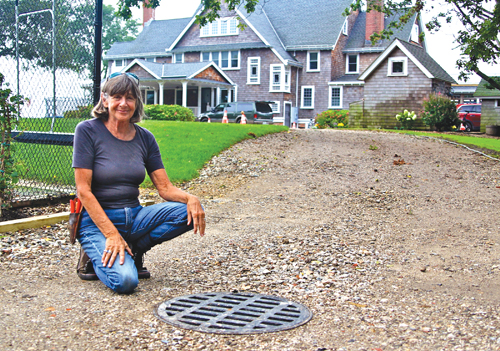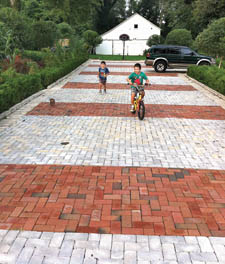Real Estate: Blacktop driveways are giving way to crushed rock

When Cesar Dubon and his family moved into their Aquebogue home four years ago, they didn’t consider an empty, barren patch next to the house a driveway.
Every time it rained, the dirt area swelled with puddles and the family would track mud into the house. Then in October, Mr. Dubon, who owns his own landscaping business, decided to do something about it.
But he didn’t want to just slap asphalt down. He wanted a different look for his home that would also be better for the environment. So, with the help of friends and family, Mr. Dubon designed a driveway using 23 pallets of bricks in different sizes and colors.
“My little brothers now have a place to play ball and ride their bikes,” said Mr. Dubon’s 19-year-old son, Jairon. “It’s a great improvement for our family.”
Mr. Dubon is just one of many homeowners who have opted against constructing a blacktop driveway and have decided to go with porous materials, which help filter pollutants away from waterways better than do impermeable surfaces.

Cutchogue landscape designer Judy Plant said she believes more homeowners are interested in keeping the natural integrity of their homes by constructing alternative driveways. She’s in the process of completing a new driveway with gray crushed stones at a waterfront home in East Marion. In addition, storm drains were added to help limit stormwater runoff.
Ms. Plant described the former 1,000-foot driveway as a “runway” and decided to give it a new, curvy look incorporating a variety of plants. She added that her creation will provide a transitional experience as you drive up to the home.
“It’s satisfying to see such a change,” Ms. Plant said.
Environmental and engineering experts agree that driveways constructed with stormwater drainage and permeable materials reduce pollution in both ground and surface waters by providing a way to filter out pollutants from water naturally through the ground. Typically, polluted waters run from asphalt roads, driveways and parking lots that lack stormwater mitigation and go straight into drains — with pollutants intact — that lead into local waterways.
Riverhead and Southold towns require landowners and contractors to incorporate stormwater mitigation plans into any new construction projects. The legislation came after the state Department of Conservation designated the towns as municipal separate storm sewer system operators under a program commonly known as MS4.
Under orders from both the U.S. Environmental Protection Agency and the DEC, the towns not only must act to improve quality in waters that fail to meet federal clean water standards but must also develop, implement and enforce stormwater management programs.
Southold and Riverhead officials said requiring landowners to maintain their own stormwater runoff isn’t new; the requirement has been part of both towns’ code since 2007. Both towns have also reached out to local contractors to ensure they’re properly trained to carry out stormwater mitigation projects.
Drew Dillingham, an assistant engineer for Riverhead hired specifically to develop the town’s MS4 plan, said the town has conducted seminars for Wading River and South Jamesport civic associations and has produced pamphlets to create awareness of MS4 requirements.
“We’re trying to educate the public, but we have a long way to go,” he said. “We’re trying to get the word out, which is such a gigantic job.”
Chris Mohr, owner of Southold-based Chris Mohr Lawn Care & Landscaping, said he believes public awareness of the environmental benefits of permeable driveways has increased over the past 10 years.
About 80 percent of his driveway installation work — from Riverhead to Orient — currently involves ripping out asphalt and installing crushed stone, which he believes is a better way to have a home blend in with the North Fork’s country flavor.
Southold resident Vivian Eyre is one homeowners who has undertaken such a project.
Mr. Mohr replaced her blacktop driveway this spring with crushed beach stone and a cobblestone apron.
“I absolutely love my new driveway,” Ms. Eyre said. “I care deeply about the environment and worry about water runoff.”
A permeable driveway is more costly than asphalt, Mr. Mohr said, but the upside is that permeable driveways require less maintenance.
While asphalt requires a seal coat about every two years, Mr. Mohr said stone driveways typically need a few yards of material every five years.
If you’re worried about the effects of plowing snow off your permeable driveway, Mr. Mohr said there won’t be any damage if you raise the plow to a slightly higher setting. And if you want to create an area where your children can play basketball, Mr. Mohr recommends installing pavers, much like patio installation work.
“There are a lot more customers now that are more concerned about the environment,” Mr. Mohr said. “More people are looking to get away from blacktop.”







